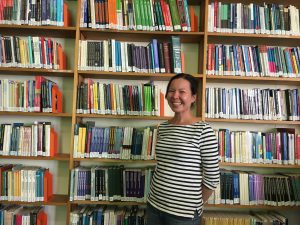Melissa is a full-time student on the department’s MSc in Applied Linguistics for Second Language Acquisition. Melissa started working as an English Language teacher in Russia after completing her undergraduate degree in Fine Art and has been a teacher for 15 years.
What degree did you apply for and why was it important to you to study this?
I’m studying for an MSc in Applied Linguistics and Second Language Acquisition. Having taught English as a Foreign Language for such a long time, it was natural for me to develop an interest in the cognitive processes underlying second language learning, and the empirical basis for current teaching methodologies and trends in materials and syllabus design.
What do you plan to do once you’ve completed your degree?
I already have a position as a teacher trainer for pre-service EFL teachers, and I hope I’ll be able to use what I’ve learnt to inform my teaching. There’s currently quite a wide gap between academic research and real-life classroom practice, and I hope I’ll be able to bridge that gap to some extent. Looking further into the future, I’m considering applying for a PhD or another form of educational research position.
What do you most value about the teaching at the department?
I value the fact that it’s demanding. You are assigned a huge amount of reading, and expected to develop an understanding of complex topics in language education, psychology, and quantitative research methods quite quickly. Obviously, it’s important to balance studying and enjoying other aspects of university life, but personally speaking, I found the high expectations placed on us to be motivating.
Why do you think it’s important to study education?
Speaking as a teacher, I would say that we make decisions every day that can have a profound effect on our students. However, we rarely have the time to consider the reasons for our actions in depth, or develop a broad theoretical understanding of important issues in education. So we often see continuing professional development as a luxury, when it really ought to be a necessity.
What’s the community like at the department?
I’m a mature student, so I really appreciate how diverse the department is in terms of age and background. There are students who have recently completed undergraduate degrees, and others who have professional experience in teaching, senior administrative positions, speech therapy, and business. That diversity of experience is also reflected in the teaching faculty. I should also mention that the librarians are amazing, and we would be completely lost without them.
What advice would you give to new postgraduate students on how they can get involved in the department community?
It isn’t physically possible to take advantage of every single opportunity on offer at Oxford. However, I strongly recommend turning up at some of the optional workshops, seminars, and conferences held at the department, even if the topic appears to be outside your subject speciality. You learn so much from listening to people talk about their research, and you never know when you’ll get a spark of inspiration from someone working in a field that seems to be only peripherally related to your interests.

